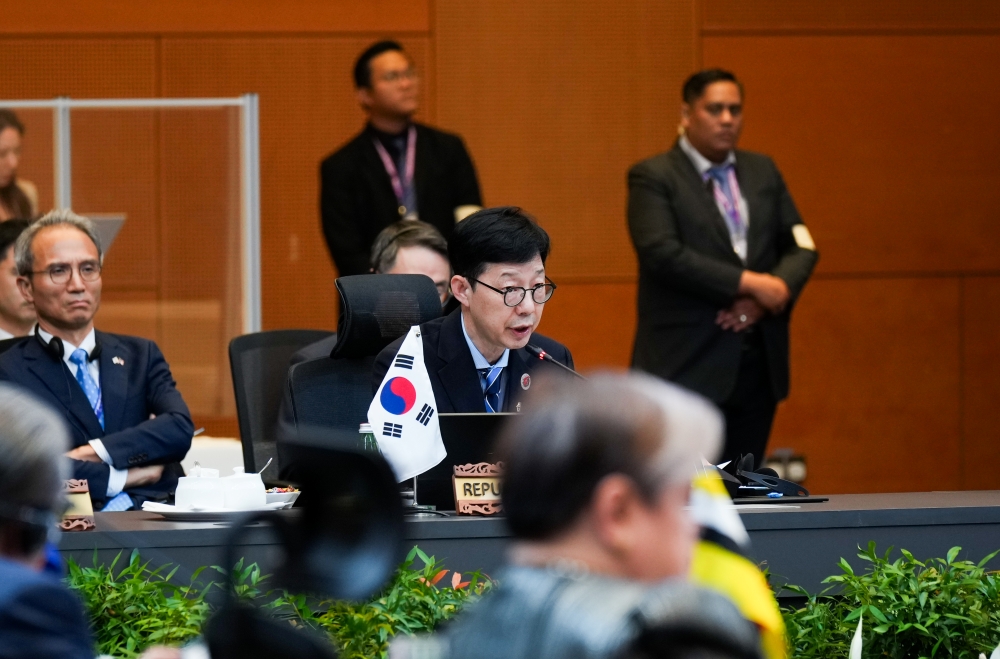-
About the Ministry
About the Ministry
- Press
- Countries & Regions
- Policy Information
- Life In Korea
Ministry News
- Notices
- Ministry News
- Press Releases
- Press Briefings
- Speeches & Published Materials
- Newsletter Service
- Diplomatic White Paper
Outcome of 26th ASEAN Plus Three Foreign Ministers’ Meeting (July 10, Malaysia)
- Date
- 2025-07-10
- hit
- 909

Vice Minister of Foreign Affairs Park Yoonjoo attended the 26th ASEAN Plus Three (APT) Foreign Ministers’ Meeting in Kuala Lumpur, Malaysia, on July 10, and exchanged views with other participants on strengthening APT cooperation as well as regional and global issues.
※ The ASEAN Plus Three (APT), launched in response to the 1997 financial crisis in East Asia, comprises the 10 ASEAN member states and Timor-Leste (observer) plus Korea, Japan and China. The APT process has developed into a functional cooperation framework with 60 consultative mechanisms across 20 areas, including economic, health, environmental, and transnational crime issues.
Recalling President Lee’s telephone conversations with the leaders of Japan and China within a week after his inauguration, Vice Minister Park underscored that the reinvigorated Korea-Japan-China trilateral cooperation and the APT mechanism would continue to build on each other. Regarding the Korean Peninsula, Vice Minister Park explained the Korean government’s efforts to achieve lasting peace and substantial progress on the complete denuclearization of the Korean Peninsula, and requested the APT’s attention and support in that regard.
In addition, Vice Minister Park emphasized the need to expand cooperation among the APT countries as a key driver of the global economy contributing to more than 40 percent of the global economic growth*. Furthermore, he suggested that, in the face of its common concerns such as aging populations as well as digital and green transition, the APT explore ways to work together to foster skilled labor force utilizing ASEAN’s demographic bonus, build ASEAN’s capacity for the implementation of DEFA, and pursue opportunities to support the ASEAN Power Grid initiative.
* Article 5 of the Joint Statement of the 28th APT Finance Ministers’ and Central Bank Governors’ Meeting (May, 2025)
※ DEFA (ASEAN Digital Economy Framework Agreement): An agreement among the ASEAN member states for cooperation on the development of the regional digital economy, targeted to be concluded by the end of 2025
※ The ASEAN Power Grid: An initiative to build a power transmission network among the ASEAN member states with the aim of improving stability and efficiency of the power supply in the region
The participants appreciated that the APT framework has effectively responded to regional crises including financial crises, natural disasters and COVID-19, since its establishment in 1997. They agreed to continue cooperation through the APT mechanisms such as the Chiang Mai Initiative Multilateralization (CMIM) and the APT Emergency Rice Reserves (APTERR).
※ The CMIM (Chiang Mai Initiative Multilateralization): A multilateral currency swap arrangement among the APT countries to provide dollar liquidity in the event of a financial crisis in any of the APT countries
※ The APTERR (ASEAN+3 Emergency Rice Reserve): A pre-stockpiled emergency rice reserve among the APT countries to ensure regional food security through sales, the provision of long-term loans, or rice donations to people affected by calamities




